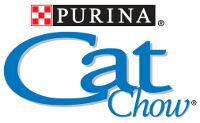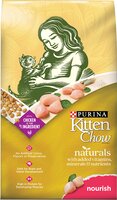
Purina Cat Chow Dog Food Ingredients
According to our research, Purina Cat Chow manufactures 1 dog food recipes using 36 unique ingredients. To evaluate the quality of ingredients used by Purina Cat Chow, we've studied all 36 ingredients. In this article, we'll share our findings on Purina Cat Chow ingredients.
| Dog Food Recipes | 1 |
| Unique Ingredients | 36 |
| Artificial Colors | 0 |
| Animal By-Products | 1 |
| Anonymous Meats | 0 |
| Controversial | 4 |
| Harmful | 1 |
First 5 Ingredients
Dog food ingredients in the United States are listed in descending order of pre-cooked weight. The first 5 ingredients typically constitute a significant portion of the recipe.
For Purina Cat Chow, these are the most common ingredients found within the first 5 dog food ingredients.
- chicken
- chicken by-product meal
- corn gluten meal
- soybean flour
- ground yellow corn
As you can see, the most common first ingredient in Purina Cat Chow is chicken. The most common 2nd ingredient is chicken by-product meal, followed by corn gluten meal, soybean flour, and ground yellow corn.
Artificial Food Coloring Dyes
Purina Cat Chow does not use any artificial food coloring dyes. According to our records, none of the 1 Purina Cat Chow dog foods contain artificial food dyes.
Artificial food coloring dyes are unnecessary and potentially harmful ingredients. In general, we not not recommend feeding any pet foods that contain artificial dyes.
In 2010, the CSPI raised serious concerns regarding the safety of many artificial dyes. Most of the studies referenced by the CSPI involved prolonged or excessive consumption. Since most dogs consume the same foods throughout their lives, concerns raised by the CSPI are alarming to say the least.
To read more about Artificial Food Dyes, click here.
Animal By-Products
Purina Cat Chow does indeed use animal by-products. More specifically, 1 animal by-product ingredient was found during our analysis of Purina Cat Chow dog food ingredients.
According to AAFCO, by-products are defined as the non-rendered, clean parts, other than meat, derived from slaughtered mammals. In other words, animal by-products are the leftover ingredients that humans typically do not consume (lung, heart, tongue, stomach, intestine, blood, etc).
Many consumers have equated animal by-products with slaughterhouse waste. Animal by-products are still very controversial. Most premium brands have abandoned them in favor of specific named organ ingredients (duck liver, chicken heart, etc).
If you must feed a product with animal by-products, ensure that the specific animal source is specified. In other words, avoid ingredients such as meat by-products or poultry by-products.
Chicken by-product meal is produced by cooking chicken by-products using a process called rendering. By-products are defined by AAFCO as the "non-rendered, clean parts, other than meat, derived from slaughtered mammals." Thus, chicken by-products contain nearly all parts of chickens which are typically not consumed by humans. These parts include the liver, lung, spleen, kidney, stomach, blood, intestine, bone, etc.
Like other meat by-products, chicken by-products are considered controversial, mainly because they are inexpensive ingredients which consumers have equated with slaughterhouse waste. However, manufactures and many experts claim that animal by-products are unjustly criticized. Proponents state that "named" by-products, such as chicken by-products, supply many important nutrients required by dogs.
The following recipes contain chicken by-product meal:
Anonymous Meat Ingredients
Anonymous meats are inexpensive low-quality ingredients that can come from practically any animal. These type of ingredients are often used to produce very inexpensive dog foods.
In general, we prefer ingredients which specify the animal source used to derive the ingredient. For example, ingredients such as duck fat are much better than animal fat or poultry fat.
In our analysis, we've looked through all 36 Purina Cat Chow ingredients. According to our data, Purina Cat Chow does not contain any anonymous animal-based ingredients.
Controversial Ingredients
In most cases, ingredients which are given the controversial classification can be substituted with higher-quality alternatives. You should evaluate each controversial ingredient independently to see if there is truly a valid cause for concern.
Keep in mind, certain sacrifices often must be made to produce dog foods at a reasonable price. In general, the more expensive the product, the fewer controversial ingredients you'll find.
In our analysis, we've identified 4 controversial ingredients inside Purina Cat Chow products. These controversial ingredients are listed below. Click on each ingredient for more information.
Soybean flour contains more than 50% protein. Therefore, soybean can significantly boost the protein content of the product. The inclusion of non-meat protein typically degrades the overall quality of protein in the recipe. This degradation is due to the inferior amino acid profile of plant based proteins.
The following recipes contain soybean flour:
Corn gluten meal is a by-product from the production of various corn products (corn starch, corn syrup, etc). It's very high in protein (nearly 60% protein) and therefore can significant boost the protein content of the product. Because plant based proteins such as corn gluten meal are inferior to meat based proteins (lack many essential amino acids), they are not suitable substitutes.
The following recipes contain corn gluten meal:
Ground yellow corn is a cereal grain which provides a modest amount of vitamins, minerals, and plant based protein. It also happens to be one of the most controversial ingredients in dog food.
Proponents of corn claim that corn is highly digestible and an excellent source of protein, energy, vitamins, minerals, and essential fatty acids.
Opponents however believe that positive claims in regards to corn are either half-truths or completely false, we'll discuss a few of the opposing arguments.
In regards to digestibility, the claims of "highly digestible" are only true if corn is processed into a meal or flour and subsequently cooked. In regards to the protein contribution, we must note that corn is a plant based protein which does not contain all of the necessary amino acids required by dogs to sustain life. Therefore substituting corn for meat is an unsuitable substitution and actually degrades the overall protein quality of the product.
Finally, we'll discuss the claims about vitamins and minerals in corn. Although corn does provide many vitamins and minerals, it not necessarily an exceptional ingredient in this regards. There are many other ingredients which are more complete and biologically appropriate. Therefore the usage of corn as the primary ingredient in dog food should certainly warrant further questioning.
The following recipes contain ground yellow corn:
Chicken by-product meal is produced by cooking chicken by-products using a process called rendering. By-products are defined by AAFCO as the "non-rendered, clean parts, other than meat, derived from slaughtered mammals." Thus, chicken by-products contain nearly all parts of chickens which are typically not consumed by humans. These parts include the liver, lung, spleen, kidney, stomach, blood, intestine, bone, etc.
Like other meat by-products, chicken by-products are considered controversial, mainly because they are inexpensive ingredients which consumers have equated with slaughterhouse waste. However, manufactures and many experts claim that animal by-products are unjustly criticized. Proponents state that "named" by-products, such as chicken by-products, supply many important nutrients required by dogs.
The following recipes contain chicken by-product meal:
Potentially Harmful Ingredients
Harmful ingredients are those which have been linked to adverse health effects. In general, we do not recommend feeding any product which contains any harmful ingredients.
There are certain situations where these ingredients may be necessary. We always recommend contacting Purina Cat Chow for further clarification regarding any harmful or controversial ingredient.
We have identified 1 harmful ingredient used in certain Purina Cat Chow recipes. To learn more, click on the ingredient's name.
Menadione sodium bisulfite complex is a synthetic version of vitamin K that has been linked to many health concerns. Research has suggested possible toxic reactions in liver cells and red blood cells among other serious problems. In fact, one large chemical supplier warns, "The substance is toxic to kidneys, lungs, liver, mucous membranes. Repeated or prolonged exposure to the substance can produce target organs damage."
The following recipes contain menadione sodium bisulfite complex:
Purina Cat Chow Dog Food Ingredient Lists

Purina Cat Chow
Naturals
Kitten Formula
Purina Cat Chow
Naturals Kitten Formula
First Five Ingredients
chickenchicken by-product meal
corn gluten meal
soybean flour
ground yellow corn
